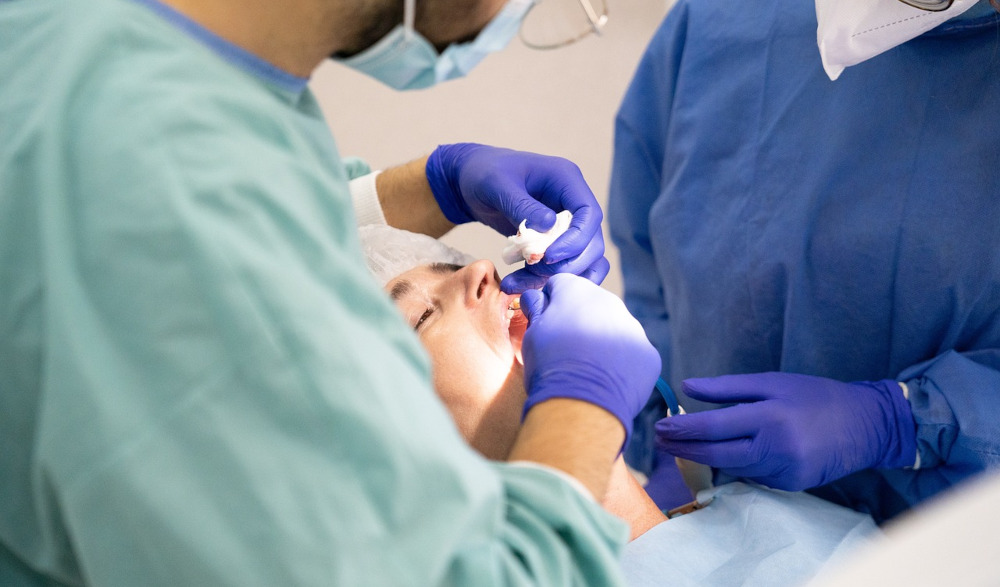How Dental Health Can Lead to Endocarditis
and Impact the Whole Body

When we think of dental health, our thoughts usually go to cavities, gum disease, or tooth loss. However, few people realize that poor oral hygiene can lead to life-threatening conditions beyond the mouth. One of these is endocarditis, an infection of the heart's inner lining, which can have far-reaching consequences for the entire body.
What is Endocarditis?
Endocarditis is an infection of the endocardium, the inner lining of the heart chambers and valves. The infection typically occurs when bacteria or other pathogens from another part of the body, such as the mouth, enter the bloodstream and attach to damaged areas of the heart. In healthy individuals, the immune system can often clear minor infections from the bloodstream, but in people with certain heart conditions, these pathogens can take hold on the heart's valves or inner lining, leading to a dangerous infection.
The Oral Health Connection
The mouth is home to millions of bacteria, most of which are harmless or beneficial. However, poor dental hygiene—such as not brushing, flossing, or regular dental checkups—can allow harmful bacteria to multiply, leading to gum diseases like gingivitis or periodontitis. These conditions cause inflammation and create a gateway for bacteria to enter the bloodstream through the inflamed or damaged gum tissues.
Once in the bloodstream, the bacteria can travel to the heart, particularly if there are already damaged heart valves or other heart abnormalities. The most common culprits are Streptococcus bacteria, which are frequently found in dental plaque.
How Endocarditis Impacts the Body
Endocarditis is a serious condition because it doesn't just affect the heart. Once the infection sets in, it can trigger a cascade of complications throughout the body:
- Heart Damage: The infection can destroy heart valves and disrupt the heart's ability to function properly, leading to heart failure if not treated in time.
- Blood Clots and Embolism: As the bacteria form colonies (often called "vegetations") on the heart valves, pieces can break off and travel through the bloodstream. These fragments can block arteries and reduce blood flow to critical organs like the brain, kidneys, or lungs.
- Stroke: If clumps of bacteria or blood clots from the infected heart travel to the brain, they can cause a stroke, potentially leading to paralysis, cognitive issues, or death.
- Organ Failure: The same emboli that cause strokes can lodge in other organs, such as the kidneys, liver, or spleen, impairing their function and leading to organ failure.
- Sepsis: Endocarditis can escalate to sepsis, a life-threatening condition where the body's immune response to the infection causes widespread inflammation, potentially resulting in tissue damage and organ shutdown.
Who is at Risk?
Not everyone is at equal risk for developing endocarditis. People with pre-existing heart conditions, such as those with artificial heart valves, congenital heart defects, or a history of rheumatic fever, are particularly susceptible. However, even healthy individuals can develop the condition if they neglect dental care and develop severe gum disease.
Preventing Endocarditis Through Good Dental Hygiene
While endocarditis is a serious condition, it is largely preventable, particularly when it comes to the dental connection. Good oral hygiene practices are essential for reducing your risk:
- Brush and Floss Regularly: Brushing twice daily and flossing helps to remove harmful plaque and bacteria, reducing the likelihood of gum disease.
- Regular Dental Checkups: Professional cleanings and checkups help catch early signs of gum disease before they escalate and allow for proper cleaning of hard-to-reach areas.
- Antibiotics Before Dental Procedures: People at high risk for endocarditis may be prescribed antibiotics before certain dental procedures to prevent bacteria from entering the bloodstream.
Conclusion
While dental care may seem unrelated to heart health, the connection between oral hygiene and conditions like endocarditis is well-established. Neglecting your teeth and gums can allow harmful bacteria to enter the bloodstream, leading to potentially fatal complications throughout the body. Regular dental care is not just about protecting your smile—it could protect your heart and overall health as well.
Love what you’re reading? Don’t miss out on future articles! Subscribe for updates on our latest posts and our bi-monthly newsletter.
Sign up now—no spam, just good vibes and holistic health insights delivered straight to your inbox!
Mayo Clinic. “Endocarditis - Symptoms and Causes.” Mayo Clinic, 2020. Web. Accessed September 22, 2024.
Baddour, Larry M, et al. “Infective Endocarditis in Adults: Diagnosis, Antimicrobial Therapy, and Management of Complications: A Scientific Statement for Healthcare Professionals from the American Heart Association.” Circulation, vol. 132, no. 15, 2015, pp. 1435–86.
Chen, Pei-Chun, et al. “Dental Procedures and the Risk of Infective Endocarditis.” Medicine, vol. 94, no. 43, Oct. 2015, p. e1826.
